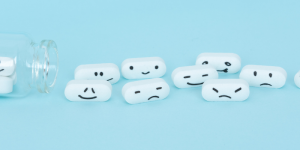In vitro fertilization (IVF) is a time-consuming and often stressful procedure, but it is increasingly being used to help couples realize their dream of having a child. But how does stress affect the success of the treatment? Researchers at Brigham and Women’s Hospital, a founding member of the Mass General Brigham healthcare system, investigated the effects of anxiety and depression in men on fertility and IVF outcomes. Their findings show no association between anxiety, regardless of antidepressant use, and IVF outcomes or live birth rates. The results were published in the journal Human Reproduction.
How Antidepressants Affect Reproduction
“Our findings suggest that despite previous concerns about the effects of antidepressants on fertility, men with anxiety or depression should not be denied treatment,” said Dr. Zachary Walker, a reproductive endocrinology and infertility specialist at the Center for Infertility and Reproductive Surgery at Brigham. The researchers conducted a voluntary, survey-based study that collected responses from 222 men undergoing IVF treatment at a hospital-affiliated fertility center between September 2018 and December 2022. The Hospital Anxiety and Depression Scale (HADS) questionnaire was used. Participants who scored eight or more points in the subcategories of the survey were classified as anxious or depressed. The study examined the association between these mental health conditions and IVF outcomes and live birth rates, as well as various sperm parameters, while also investigating the prevalence of erectile dysfunction and low libido in the cohort.
The results showed that 22.5% of respondents suffered from anxiety and 6.5% from depression according to HADS scores. There was no significant difference in live birth rates between individuals with and without anxiety, although men with anxiety had a lower average total number of motile sperm during egg retrieval. Walker and the team found that IVF outcomes and live birth rates were not affected by antidepressant use. Furthermore, there were no statistically significant results regarding erectile dysfunction or low libido between the groups.
“There is debate among fertility specialists about prescribing antidepressants during IVF due to possible effects on fertility. However, stress itself can alter hormone balance and sometimes lead to a condition called hypogonadotropic hypogonadism, in which the brain signals our reproductive organs to stop functioning because we are too stressed to get pregnant,” Walker explained. “So while anxiety medication can affect fertility, so can stress. Given that IVF is known to be stressful, our findings underscore the importance of prioritizing patients’ mental health during fertility treatment.”
How Stress Affects IVF and Birth Outcomes
Limitations of the study included the inability to assess sperm morphology at the time of egg retrieval and the inability to assess the full impact of depression scores on fertility due to the small proportion of participants with high depression scores. The researchers were also unable to fully assess all of the patients’ hormone levels, something they plan to investigate in the future.
About 80 percent of the cohort was of Caucasian descent, which Walker said could indicate access barriers such as cost and insurance coverage that many medically underserved ethnic groups face when seeking fertility treatments. In the future, the researchers plan to examine patients’ hormone levels throughout the duration of fertility treatment to better understand how stress affects IVF and birth outcomes. These findings add to a growing body of literature examining general medical health and male fertility.





